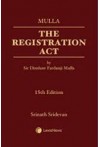- Author(s): Dinshaw Fardunji Mulla, K.Kannan
- Publisher: LexisNexis
- Edition: 15 Ed 2025
- ISBN 13 9788197759048
- Approx. Pages 1026 + Contents
- Format Hardbound
- Approx. Product Size 24 x 16 cms
- Delivery Time 3-5 working days (within Kerala & South India) (Others 7-9 days)
- Shipping Charge Extra (see Shopping Cart)
.............................................................................................................................
Description
The Registration Act serves the twin purpose of providing permanent record of transmission of rights of individuals relating, essentially to immovable properties; The issue of admissibility of unregistered documents is invariably a point of dispute at a trial of civil case, for, there is a conflict of interest of individuals avoiding the burden of suffering duties and the State zealously protecting its revenue source. As opposed to the British legacy for the legal system that we have inherited, the limited extent in different parts of India, where the Portuguese and French ruled, observed the practice of the Continent in the West that saw the registration exercise as an occasion for State's imprimatur for granting good title through registered instruments and consequently, the registering offices themselves were called as Bureau de Authentique, an office that would authenticate documents, just not of execution but of title itself. Consequently, even a Will, if it is registered, will be taken as valid and creating title in favour of the beneficiary, unless it is challenged before a civil court and set aside on any ground tenable in law. Courts' power to adjudicate on title has always been seen as paramount in both the Indi-British and Continental legal systems. Courts in India never ceded their authority of title adjudication to registering officers. This is so even when State rules and statutory amendments attempted to make possible the power to registering Officers to refuse registration or cancel registration subsequently, when defects in title were seen or when public properties vesting in government or in trust were attempted to be transacted by private individuals. The decisions of High Courts of Karnataka, Delhi, Madras, Sikkim are illustration of this judicial thinking. Unilateral cancellation of document was also seen as impermissible, for it was a breeding ground for litigation. The point of reference in Satya Pal Anand v State of MPs to a three member bench of the Supreme Court yielded nothing significant, for the Supreme Court did no more than referring the matter to the Registrar of Cooperative Societies to decide whether there is justifiable grounds for cancelation of allotment and of registration without squarely addressing the divergent views expressed by the two member bench on the action of the High Court in summarily rejecting the writ challenging the power of the registering authority to register an unilateral cancellation deed.
.............................................................................................................................
Contents
The Registration Act, 1908
Part I - Preliminary
Part II - Of the Registration Establishment
Part III - Of Registration Documents
Part IV - Of the time for Presentation
Part V - Of the Place Of Registration
Part VI - Of Presenting Documents for Registration
Part VII - Of Enforcing the Appearance of Executants And Witnesses
Part VIII - Of Presenting Wills and Authorities to Adopt
Part IX - Of the Deposit of Wills
Part X - Of the Effects of Registration and Non-Registration
Part XI - Of the Duties and Powers of Registering Officers
Part XII - Of Refusal to Register
Part XIII - Of the Fees for Registration, Searches and Copies
Part XIV - Of Penalties
Part XV - Miscellaneous
Appendix
Subject Index
.............................................................................................................................
Author Details
Sir Dinshaw Fardunji Mulla
Justice K. Kannan, Judge, Punjab & Haryana High Court Chandigarh
.............................................................................................................................

